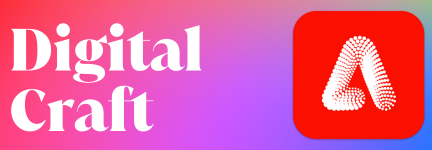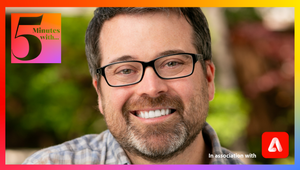
“Successful Brands Are on a Relentless Pursuit to Understand the Customer”

Adobe XD is a proud supporter of LBB. Over the upcoming months, as part of the sponsorship of the Digital Craft content channel, we will be spending time with some of the most innovative and creative minds in the industry.
In this conversation we talk with Keith Pine, chief operating officer at Isobar. Keith’s role puts him at the forefront of business’ relationship with technology, providing a vantage point from which to observe the ways in which multiple industries are changing due to tech. Here, Keith reflects on the immediate challenges facing businesses, how the pandemic is re-enforcing long-term changes, and why lockdown sparked a re-connection with his favourite movies and DJ sets...
LBB> Your degree is in computer art - so do you see yourself first and foremost as a creative, or as a technologist?
Keith> That's a tough one to start! I started out in VFX where the worlds of creative and technology are one and the same. Back then I never really identified myself one way or another. In many ways, I still feel the same today.
When I look at where I am professionally and what I do now, it's tough to put myself into any one type of category. The nature of creative, technology and business has also expanded, converged and atomised so much in recent years it's hard, if not impossible, to draw any type of boundary.
The professional marketplace creates an environment where individuals have to self-identify as a specialist and neatly define what they 'are' and 'are not'. But I don’t think that is the reality of a modern skill set, and it’s definitely not in the interest of the best outcomes.
My curiosities and interests have been the gravity that's moved me throughout my career. I've been fortunate enough to be able to draw from my spectrum of experience and apply it to what I do each day.
LBB> In your current role at Isobar, you help brands create the conditions for success in the digital economy. Can I ask - what are those conditions?
Keith> At first glance, the brands and organisations that stand out as leaders of today's digital economy take various shapes and forms. But beneath the surface you’ll find a consistent approach of holistically leveraging modern strategies to adapt or create new business models and offerings for today's digital age.
At the center is the relentless pursuit to understand the customer, their journey and points of friction in an authentic and human manner. From that stems the creation and orchestration of new and improved services, products and communications that are connected and contextualised.
Next up is leveraging data as a strategic asset and input to create value for your business and customers through things like personalisation, contextualisation, machine learning, and extracting insights at scale.
All of this is enabled and supported by infrastructure which I think about in two categories. The first is around the commitment to invest in a connected tech stack to bring this proposition to life. Lastly and most critical is the notion of organisational culture and structure. Organisations that are playing catch up typically are structured for the analog age and the cultural mindset usually follows suit from that.
LBB> For many businesses, the pandemic has been a disaster. Do you think it’s possible for these industries/sectors to fit back into a post-Covid world, or is the landscape changing permanently?
Keith> This is an exceptionally difficult time for so many industries. COVID has forced so many organizations to take a long, hard look at the realities of their economic model, value proposition and customer experience as a necessary measure of survival. At this stage in the game I think most businesses have shifted from reactionary mode to strategy mode.
The reality is that so many of the friction points that have been addressed by way of COVID weren't caused by COVID. They have existed for quite some time but weren't given the proper attention and are now exacerbated. The acceleration and growth of customer needs and preferences is becoming more and more specific and polarised.
I think this generation will emerge from this time with a heightened and lingering awareness of physical proximity and interactions with natural and artificial surfaces as well as a deeper consciousness of where and how they choose to spend their time. These are all areas where brands can provide value and technologies like VR/AR, computer vision, and natural language processing are well aligned to power these solutions.
Ultimately, the battleground for attention and dollars will be fought across the dimension of customer experience (CX). The brands that have the capital, the willingness to adapt, and courage to take meaningful action have the best chance of weathering this storm.
LBB> You’re the co-founder of Synthetic, a division of Organic dedicated to cognitive transformation. Do you apply any of your expertise from that role to your current one helping businesses?
Keith> Absolutely. Creating the Synthetic offering was an incredible experience. That team was an exceptionally talented group of individuals who did some truly breakthrough work. I am very proud to be associated with that effort and everyone who was involved. During that time I learned a lot and proved out a lot of concepts that I still hold to be true and apply to this day.
Everything we did stemmed from a few core beliefs….
Bloat is bad - The idea here is that a small, talented group of individuals who have the right attitude and chemistry can make big things happen in record time. That approach to teaming enabled us to move really quick. We would conceptualise, build and validate experiences in days and weeks, where it would take larger, more traditionally staffed teams months to accomplish the same result.
Stop talking and start making - We operated under the notion of doing just enough strategy and just enough planning to get things started. Strategy and planning has its purpose but so many teams get sucked into the vortex of over intellectualising and over planning . 99% of that thinking typically goes out the window the moment you put something in front of a user. So, why waste the calories? Trust your gut, make something, test it and iterate from there.
Build a house brick by brick - Many clients were hesitant to explore and invest in AI powered experiences. This was new and unproven territory in many ways. The solutions we put in front of clients weren't typical and sat way outside of their comfort zone. We made the most traction by breaking our solutions into smaller experiences that could be scaled later. This allowed clients to experiment with a minimal investment to create a fully functional artifact that produced real results that they could then shop around as a proof of concept.
LBB> You’ve said that AI can help create ‘more human’ digital experiences. What do you mean by that?
Keith> Digital user experiences have come a very long since the dawn of the commercial internet but even by today's standards the majority are designed as somewhat rigid experiences that are driven by a cursor, finger or text-based input. People have become accustomed to this and have largely accepted it only because that is what has been presented to them. This type of design is more a result of iterating on technology limitations from another age as opposed to designing for how humans naturally seek information and interact.
With AI we have the opportunity to break through this paradigm and leverage so much of what science can offer. Here's one good example. I visited a large home improvement retailer recently to figure out what I needed to fix my front door. I am not a handy guy and even after my internet research I wasn’t certain what tools and hardware I needed to perform the repair properly. I stumbled around with the in-store kiosk that was positioned as an alternative to a sales associate but I gave up once I realised the software wizard was too rigid to give me the information I needed with the knowledge I had. I eventually found an associate, described the situation, showed him a picture of where the door was broken and then had what I needed in a few minutes.
The kiosk might have had the answer I needed but failed to help me because it was designed to receive and interpret a fixed set of inputs that were different from what I could provide. Conceptually, an AI-powered kiosk could have used my verbal and image based description of the issue and provided the same results as the associate, and gotten better at helping customers with the same problem later down the line.
LBB> And what about digital experiences more broadly, particularly in the events and entertainment space? Do you think technological advancements mean we might never see a return to a pre-Covid events industry?
Keith> I don’t think events will be the same as they were pre-COVID, I frankly think they will be much better and people will have more choices as to how they participate.
Virtual events are here to stay as a permanent replacement or augmentation to many live events. The inability to gather in large groups has created the necessity to improve the quality and fidelity of virtual events in recent months. The Travis Scott Fortnite concert and the recent fully digital AR/VR Facebook Connect conference stand as the perfect examples of that. This coupled with the economical efficiencies and scaled accessibility makes them a very attractive option for businesses and participants.
However, live events are not going away by any means. They will likely evolve to more of a live/virtual hybrid. I believe people are deeply hungry for the energy and excitement that only a live event can provide. There isn't a technological equivalent to the feeling of being at a live concert, comedy show or sporting event and people have not forgotten that. I think you will start to see a bigger and more meaningful incorporation of virtual audiences into live shows and a more sophisticated and connected pre and post event experience to virtual and live audiences. Venues are also going to have to up there game to accommodate new safety requirements and customer demands. Friction points that take away from the core experience like, checking in, waiting in line, ordering food, finding your seat will be streamlined or eliminated.
LBB> Finally, the world can feel like something of a dark place right now. But, day-to-day, what’s helping you to be inspired and stay positive?
Keith> One of the blessings about working from home has created the space for me to spend more quality time with my two young boys, Dean and Antonio. That has been the gift and silver lining of this time. I am thankful for that every day.
And to be quite honest, I've also reconnected with many movies from my life that I love and rediscovered many classic mixes from my favourite DJ's on YouTube. These times have clarified what matters and what I enjoy the most.















